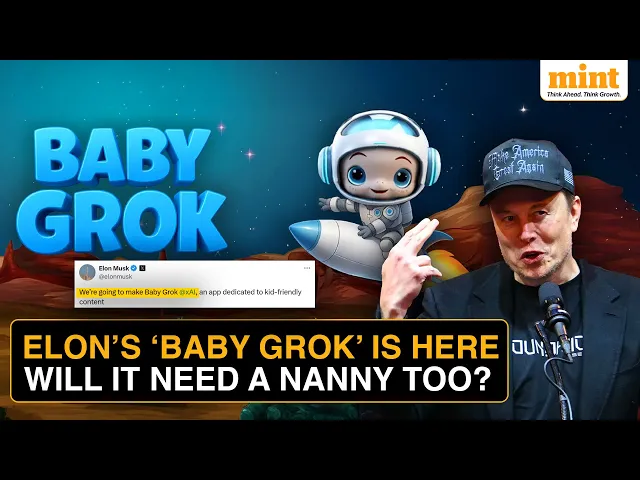Elon Musk Launches ‘Baby Grok’ — But Is AI Safe For Kids?

Baby Grok raises AI safety concerns
In a move that has sparked both fascination and concern across the tech community, Elon Musk has unveiled "Baby Grok," a child-friendly version of xAI's conversational AI. The announcement comes as AI increasingly permeates our daily lives, raising critical questions about how these powerful technologies should interact with our most vulnerable users—children.
The landscape of child-AI interaction is rapidly evolving
-
Baby Grok represents a significant shift in AI targeting: Unlike most AI systems designed primarily for adults or general audiences, Baby Grok explicitly targets children, opening new frontiers in how AI companies approach younger demographics while raising questions about appropriate safeguards.
-
Safety mechanisms remain largely undefined: While Musk promises Baby Grok will be "aligned with family values," the specifics of these protections—including content filtering, supervision requirements, and data privacy safeguards—remain nebulous at best, creating uncertainty around implementation.
-
Regulatory frameworks lag behind technological development: Current oversight of child-focused AI remains fragmented and incomplete, with existing protections like COPPA (Children's Online Privacy Protection Act) not fully addressing the nuanced concerns of generative AI interactions with minors.
-
AI literacy becomes increasingly critical: As these technologies become available to younger users, the gap in digital literacy—both for children and their caregivers—presents significant challenges in ensuring appropriate, safe, and educational AI engagement.
The unresolved tension between innovation and protection
Perhaps the most insightful aspect of this development is the fundamental tension it reveals between technological advancement and child safety. This isn't merely about one product but represents a broader inflection point for the entire AI industry. As AI becomes more accessible and human-like, the boundaries between beneficial educational tools and potentially harmful influences grow increasingly blurred.
This matters profoundly because we're effectively conducting a real-time experiment with significant stakes. Research on child development in the digital age already shows mixed results regarding screen time and digital interactions. Adding sophisticated AI to this mix introduces variables we barely understand. The developmental impacts—both positive and negative—could be substantial, affecting how an entire generation relates to technology, processes information, and even develops critical thinking skills.
Looking beyond the headlines
What the Baby Grok announcement doesn't address is the growing body of
Recent Videos
How To Earn MONEY With Images (No Bullsh*t)
Smart earnings from your image collection In today's digital economy, passive income streams have become increasingly accessible to creators with various skill sets. A recent YouTube video cuts through the hype to explore legitimate ways photographers, designers, and even casual smartphone users can monetize their image collections. The strategies outlined don't rely on unrealistic promises or complicated schemes—instead, they focus on established marketplaces with proven revenue potential for image creators. Key Points Stock photography platforms like Shutterstock, Adobe Stock, and Getty Images remain viable income sources when you understand their specific requirements and optimize your submissions accordingly. Specialized marketplaces focusing...
Oct 3, 2025New SHAPE SHIFTING AI Robot Is Freaking People Out
Liquid robots will change everything In the quiet labs of Carnegie Mellon University, scientists have created something that feels plucked from science fiction—a magnetic slime robot that can transform between liquid and solid states, slipping through tight spaces before reassembling on the other side. This technology, showcased in a recent YouTube video, represents a significant leap beyond traditional robotics into a realm where machines mimic not just animal movements, but their fundamental physical properties. While the internet might be buzzing with dystopian concerns about "shape-shifting terminators," the reality offers far more promising applications that could revolutionize medicine, rescue operations, and...
Oct 3, 2025How To Do Homeless AI Tiktok Trend (Tiktok Homeless AI Tutorial)
AI homeless trend raises ethical concerns In an era where social media trends evolve faster than we can comprehend them, TikTok's "homeless AI" trend has sparked both creative engagement and serious ethical questions. The trend, which involves using AI to transform ordinary photos into images depicting homelessness, has rapidly gained traction across the platform, with creators eagerly jumping on board to showcase their digital transformations. While the technical process is relatively straightforward, the implications of digitally "becoming homeless" for entertainment deserve careful consideration. The video tutorial provides a step-by-step guide on creating these AI-generated images, explaining how users can transform...
